
Future
Leaders
photography by EMILY PAINE

photography by EMILY PAINE
- Nearly 300 companies formed
- More than 96,000 hours of public service
- Almost $480,000 raised and donated to charitable causes.
Stats aside, for many students MGMT 101 is a life-altering experience that helps shape them as leaders, makes them more reflective thinkers and leads to lifelong friendships.
“Students don’t just take the course. They live it,” says Raquel Alexander, dean of the College of Management. “They learn how to work in teams, build and manage a startup, and make an impact on the community.”
The class — which requires students to form fully functioning companies that sell products to benefit public-service projects — involves real capital and real risk. This doesn’t deter about a quarter of all Bucknell students, from across disciplines, to sign on.
“Other schools that have adapted the course generally gear it toward management students,” says Professor Tammy Hiller, management, one of four MGMT 101 instructors. “We see Management 101 as a pivotal part of general education. Everyone needs to understand how to effectively organize, collaborate and manage change.”
Because MGMT 101 companies partner with charitable organizations, the class can also have a powerful emotional component. Past MGMT 101 teams have worked with high-school students with disabilities to develop a learning space geared toward independent living. They’ve created a children’s play garden. And they’ve captured stories told by senior citizens suffering from dementia.
For Tom Piccolo ’11, interviewing nursing facility resident Theresa Mack was an unexpected but rewarding part of his MGMT 101 experience.
“She’d had a stroke and had difficulty speaking,” he recalls. “But there were flashes of her old self, before she was ill. It was very special to know that her family was able to see the best of side of her” after Mack passed away in 2008.
MGMT 101 continually evolves. But one defining element remains constant. While similar classes are usually capstone courses at other universities, Bucknell’s management majors typically take MGMT 101 as second-semester first-year students or first-semester sophomores.
“We throw students into the deep end,” says Professor Eric Martin, management, part of the MGMT 101 teaching team. The goal, he adds, is for students to grapple with material they’ll later study in more traditional classes.
Introspection is also an important part of MGMT 101. “We want to teach students how to use their own experiences as data for reflection,” Hiller explains, adding that the student-formed companies celebrate completion of the course by screening videos that capture their experiences.
“It’s always exciting to see the impact each semester,” she adds. “It usually ends with a lot of laughter and cheers.”
FROM AN INITIAL PROPOSAL that went awry to a product glitch so bad it resulted in the uncomfortable reassignment of a team member, MGMT 101 was a dose of reality for Eden Elam ’20.
And yet, her many positive experiences as vice president of reports for a company called A Jog Down Market Street inspired Elam to major in management.
“We completed a really fulfilling project,” she says, explaining that the company sold jogging pants to support renovations at the Lewisburg branch of CONCERN, a foster-care and counseling organization. “We worked hard with the stakeholders to make sure they got what they wanted.”
However, a team member’s miscommunication with a vendor, which resulted in the shipment of an inferior product, nearly torpedoed the company’s plans. Suddenly unable to sell the lower-quality joggers for the anticipated price point, the team feared it would fail to earn enough profits to deliver on promises made to CONCERN.
Remedying the issue — and restructuring the company — were difficult challenges. But Elam says she grew by working as part of a team in a high-pressure situation.
“In the beginning, I thought I had to have the final say in everything,” she recalls. “The biggest lesson I learned was how to work with other people. And all of the effort you put in — all of the late nights — in the end, you’re helping someone else.”


Rich Karcher ’05, director at Wyndham Worldwide



“We misread the rules,” recalls Nowlin — then project CEO, now CEO of Uscape Apparel. “After two or three revisions, our plan was rejected immediately, because it was missing prior versions.”
In the wee hours, with papers spread across the floor, Nowlin realized the lost information could never be recovered. “We can’t fix it,” he told his team. “So we’re going to own it.”
Today, Nowlin considers MGMT 101’s emphasis on allowing students to err and resolve mistakes a course strong point.
“You learn that you can either blame somebody else, get in a fight, or own up to it,” he says.
The class had another big takeaway for Nowlin: Uscape’s products — men’s and women’s clothing and headwear featuring university skylines — evolved in part from T-shirts his MGMT 101 company sold to benefit RiverWoods Senior Living Community.
Nowlin wore one of his MGMT 101 tees, depicting Rooke Chapel, Bertrand Library and the Elaine Langone Center, while studying in Spain, where students from other universities expressed interest in buying similar products.
Campus buildings, Nowlin notes, “have an emotional connection to your school and your memories.”
Today, Uscape, now headquartered in Irvine, Calif., supplies 340 bookstores at 300 universities across the United States, and Nowlin still uses lessons from MGMT 101.
“The professors throw you into so many things at once on the first day,” he adds. “They see who rises to the top.”


Krissy Johnson Jones ’04

“The chocolate-chip cookies we were selling went stale,” he recalls. “Somebody’s grandmother knew that if we put bread in the bags, the cookies would soften again. The key lesson we learned was that we had to pivot quickly to rescue our business.”
Lebda adds that the experience also taught him that there’s no way for a business to anticipate every possible problem or opportunity, no matter how carefully individuals within the organization might plan and strategize.
For Lebda, MGMT 101 also established a foundation that he drew upon in subsequent courses.
“You see glimpses of every aspect of the business, so when you’re sitting in a strategizing class or a financial-management class, you can relate the material to what you experienced in 101,” he explains. “It’s your toe in the water.”
Lebda adds that MGMT 101’s emphasis on social responsibility and “action-based learning” helped to shape his own attitudes toward charitable giving.
“Management 101 laid the cornerstone for how I think about philanthropy, which also needs to be action-based,” he says.
Toward that end, the LendingTree Foundation, currently under development, will aim to provide individuals with tools they can use to overcome financial and personal obstacles.
“At LendingTree, we empower consumers to make sound and advantageous financial decisions by giving them information and options,” Lebda says. “The LendingTree Foundation, like Management 101, will be focused on that type of action-based learning.”
Lebda also credits Professor Emeritus John Miller, who created MGMT 101, with making the course memorable.
“He was a pioneer and a phenomenal professor,” Lebda says. “Management 101 was the perfect way to dig into everything else that you’ll do as a management major.”